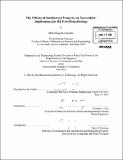The effects of intellectual property on innovation : implications for R&D in biotechnology
Author(s)
Gonzalez, Muriel Eugenia
DownloadFull printable version (9.457Mb)
Other Contributors
Massachusetts Institute of Technology. Technology and Policy Program.
Advisor
Kenneth A. Oye.
Terms of use
Metadata
Show full item recordAbstract
The effects of Intellectual Property Rights (IPRs) on innovation in the field of biotechnology are considered through assessment of their effects on upstream innovation and downstream development. Two case studies involving research tools representing forms of upstream innovation are analyzed to identify factors enabling or hindering downstream innovation. The proprietary technologies of recombinant DNA (rDNA) and Polymerase Chain Reaction (PCR) are assessed in relation to both their development and their diffusion strategies. Factors considered are: the type of IPRs, legal circumstances, the strategy regarding disclosure, whether a basic research exemption exists, enforcement of IPRs, the invention's characteristics, the economic resources available (private vs. public), and the development setting. Assessment of these cases requires consideration of the current intellectual property regime and its associated problems. These principally include the importance of the context (including the legal framework), the strategy adopted by the owners of the IPRs regarding diffusion, the type of development setting, and the invention's characteristics. Ways of dealing with these issues within the traditional IPR systems are assessed, such as patents and trade secrets, for which corresponding types of licenses can provide solutions. Additionally, new approaches are assessed, such as patent pools, clearinghouses, open source models, liability regimes, experimental use exemption, and compulsory licensing. These alternatives are considered both in the United States and under different international regimes. Finally, the potential policy implications of IPRs, both in the United States and internationally, are evaluated with regard to their effects on innovation in biotechnology.
Description
Thesis (S.M. in Technology and Policy)--Massachusetts Institute of Technology, Engineering Systems Division, Technology and Policy Program, 2010. Cataloged from PDF version of thesis. Includes bibliographical references (p. 75-80).
Date issued
2010Department
Massachusetts Institute of Technology. Engineering Systems DivisionPublisher
Massachusetts Institute of Technology
Keywords
Engineering Systems Division., Technology and Policy Program.